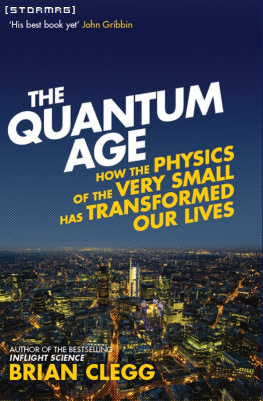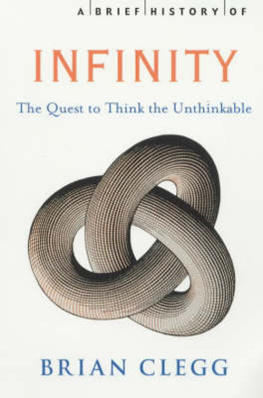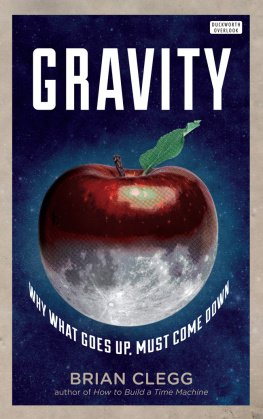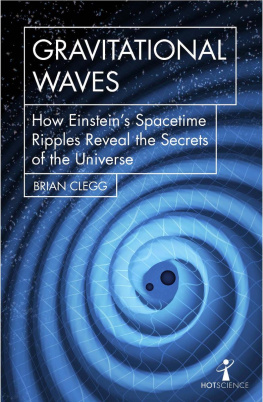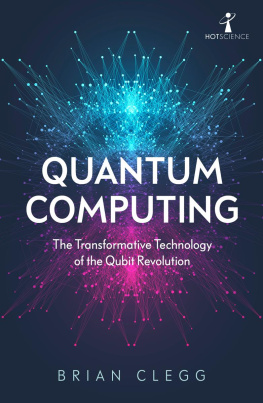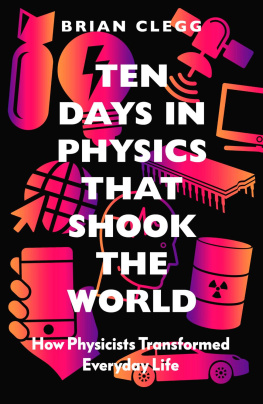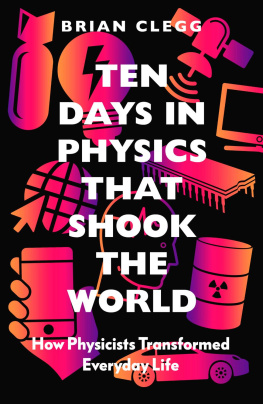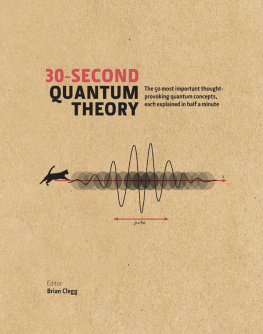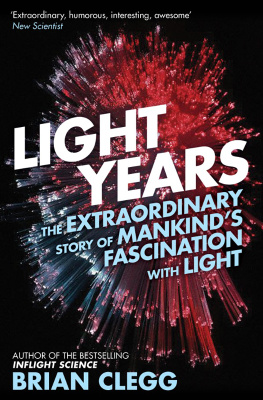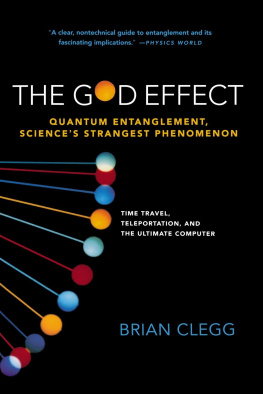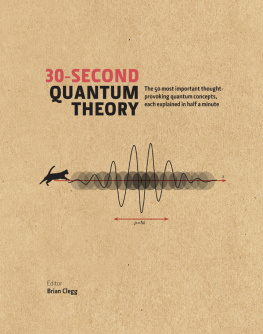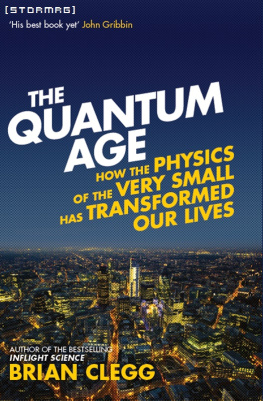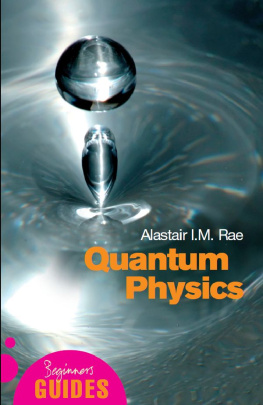Clegg - The Quantum Age: How the Physics of the Very Small has Transformed Our Lives
Here you can read online Clegg - The Quantum Age: How the Physics of the Very Small has Transformed Our Lives full text of the book (entire story) in english for free. Download pdf and epub, get meaning, cover and reviews about this ebook. City: London, UNKNOWN, year: 2015, publisher: Icon Books Ltd, genre: Science. Description of the work, (preface) as well as reviews are available. Best literature library LitArk.com created for fans of good reading and offers a wide selection of genres:
Romance novel
Science fiction
Adventure
Detective
Science
History
Home and family
Prose
Art
Politics
Computer
Non-fiction
Religion
Business
Children
Humor
Choose a favorite category and find really read worthwhile books. Enjoy immersion in the world of imagination, feel the emotions of the characters or learn something new for yourself, make an fascinating discovery.
The Quantum Age: How the Physics of the Very Small has Transformed Our Lives: summary, description and annotation
We offer to read an annotation, description, summary or preface (depends on what the author of the book "The Quantum Age: How the Physics of the Very Small has Transformed Our Lives" wrote himself). If you haven't found the necessary information about the book — write in the comments, we will try to find it.
Clegg: author's other books
Who wrote The Quantum Age: How the Physics of the Very Small has Transformed Our Lives? Find out the surname, the name of the author of the book and a list of all author's works by series.
The Quantum Age: How the Physics of the Very Small has Transformed Our Lives — read online for free the complete book (whole text) full work
Below is the text of the book, divided by pages. System saving the place of the last page read, allows you to conveniently read the book "The Quantum Age: How the Physics of the Very Small has Transformed Our Lives" online for free, without having to search again every time where you left off. Put a bookmark, and you can go to the page where you finished reading at any time.
Font size:
Interval:
Bookmark:
THE QUANTUM AGE
HOW THE PHYSICS OF THE VERY SMALL HAS TRANSFORMED OUR LIVES
BRIAN CLEGG

Published in the UK in 2014 by
Icon Books Ltd, Omnibus Business Centre,
3941 North Road, London N7 9DP
email:
www.iconbooks.com
Sold in the UK, Europe and Asia
by Faber & Faber Ltd, Bloomsbury House,
7477 Great Russell Street,
London WC1B 3DA or their agents
Distributed in the UK, Europe and Asia
by TBS Ltd, TBS Distribution Centre, Colchester Road,
Frating Green, Colchester CO7 7DW
Distributed in South Africa
by Jonathan Ball, Office B4, The District,
41 Sir Lowry Road, Woodstock 7925
Distributed in Australia and New Zealand
by Allen & Unwin Pty Ltd,
PO Box 8500, 83 Alexander Street,
Crows Nest, NSW 2065
Distributed in Canada by
Penguin Books Canada,
90 Eglinton Avenue East, Suite 700,
Toronto, Ontario M4P 2YE
Distributed to the trade in the USA
by Consortium Book Sales and Distribution
The Keg House, 34 Thirteenth Avenue NE, Suite 101
Minneapolis, Minnesota 55413-1007
ISBN: 978-184831-664-5
Text copyright 2014 Brian Clegg
The author has asserted his moral rights.
No part of this book may be reproduced in any form, or by any means, without prior permission in writing from the publisher.
Typeset in Melior by Marie Doherty
Printed and bound in the UK by Clays Ltd, St Ives plc
About the author
Science writer Brian Clegg studied physics at Cambridge University and specialises in making the strangest aspects of the universe from infinity to time travel and quantum theory accessible to the general reader. He is editor of www.popularscience.co.uk and a Fellow of the Royal Society of Arts. His previous books include Inflight Science, Build Your Own Time Machine, The Universe Inside You, Dice World and Introducing Infinity: A Graphic Guide.
www.brianclegg.net
For Gillian, Chelsea and Rebecca
Acknowledgements
With thanks as always to my editor, Duncan Heath, for his help and support, and to all those who have provided me with information and assistance you know who you are.
One person I would like to mention by name is the late Richard Feynman, whose books enthralled me and who turned quantum theory from a confusing mystery to an exciting challenge.
Introduction
The chances are that most of the time you were at school your science teachers lied to you. Much of the science, and specifically the physics, they taught you was rooted in the Victorian age (which is quite probably why so many people find school science dull). Quantum theory, special and general relativity, arguably the most significant fundamentals of physics, were developed in the 20th century and yet these are largely ignored in schools, in part because they are considered too difficult and in part because many of the teachers have little idea about these subjects themselves. And thats a terrible pity, when you consider that in terms of impact on your everyday life, one of these two subjects is quite possibly the most important bit of scientific knowledge there is.
Relativity is fascinating and often truly mind-boggling, but with the exception of gravity, which I admit is rather useful, it has few applications that influence our experience. GPS satellites have to be corrected for both special and general relativity, but thats about it, because the classical physics that predates Einsteins work is a very close approximation to whats observed unless you travel at close to the speed of light, and is good enough to deal with everything from the acceleration of a car to planning a Moon launch. But quantum physics is entirely different. While it too is fascinating and mind-boggling, it also lies behind everything. All the objects we see and touch and use are made up of quantum particles. As is the light we use to see those objects. As are you. As is the Sun and all the other stars. Whats more, the process that fuels the Sun, nuclear fusion, depends on quantum physics to work.
That makes the subject interesting in its own right, something you really should have studied at school; but there is far more, because quantum science doesnt just underlie the basic building blocks of physics: it is there in everyday practical applications all around you. It has been estimated that around 35 per cent of GDP in advanced countries comes from technology that makes use of quantum physics in an active fashion, not just in the atoms that make it up. This has not always been the case we have undergone a revolution that just hasnt been given an appropriate label yet.
This is not the first time that human beings have experienced major changes in the way they live as a result of the development of technology. Historians often highlight this by devising a technological age. So, for instance, we had the stone, bronze and iron ages as these newly workable materials made it possible to produce more versatile and effective tools and products. In the 19th century we entered the steam age, when applied thermodynamics transformed our ability to produce power, moving us from depending on the basic effort of animals and the unpredictable force of wind and water to the controlled might of steam. And though it is yet to be formally recognised as such, we are now in the quantum age.
It isnt entirely clear when this era began. It is possible to argue that the use of current electricity was the first use of true quantum technology, as the flow of electricity through conductors is a quantum process, though of course none of the electrical pioneers were aware that this was the case. If that is a little too concealed a usage to be a revolution, then there can be no doubt that the introduction of electronics, a technology that makes conscious use of quantum effects, meant that we had moved into a new phase of the world. Since then we have piled on all sorts of explicitly quantum devices from the ubiquitous laser to the MRI scanner. Every time we use a mobile phone, watch TV, use a supermarket checkout or take a photograph we are making use of sophisticated quantum effects.
Without quantum physics there would be no matter, no light, no Sun and most important, no iPhones.
Ive already used the word quantum thirteen times, not counting the title pages and cover. So it makes sense to begin by getting a feel for what this quantum word means and to explore the weird and wonderful science that lies behind it.
CHAPTER 1
Enter the quantum
Until the 20th century it was assumed that matter was much the same on whatever scale you looked at it. When back in Ancient Greek times a group of philosophers imagined what would happen if you cut something up into smaller and smaller pieces until you reached a piece that was uncuttable (atomos), they envisaged that atoms would be just smaller versions of what we observe. A cheese atom, for instance, would be no different, except in scale, to a block of cheese. But quantum theory turned our view on its head. As we explore the world of the very small, such as photons of light, electrons and our modern understanding of atoms, they behave like nothing we can directly experience with our senses.
A paradigm shift
Realising the very different reality at the quantum level was what historians of science like to give the pompous term a paradigm shift. Suddenly, the way that scientists looked at the world became different. Before the quantum revolution it was assumed that atoms (if they existed at all many scientists didnt really believe in them before the 20th century) were just like tiny little balls of the stuff they made up. Quantum physics showed that they behaved so weirdly that an atom of, say, carbon has to be treated as if it is something totally different to a piece of graphite or diamond and yet all that is inside that lump of graphite or diamond is a collection of these carbon atoms. The behaviour of quantum particles is strange indeed, but that does not mean that it is unapproachable without a doctorate in physics. I quite happily teach the basics of quantum theory to ten-year-olds. Not the maths, but you dont need mathematics to appreciate whats going on. You just need the ability to suspend your disbelief. Because quantum particles refuse to behave the way youd expect.
Next pageFont size:
Interval:
Bookmark:
Similar books «The Quantum Age: How the Physics of the Very Small has Transformed Our Lives»
Look at similar books to The Quantum Age: How the Physics of the Very Small has Transformed Our Lives. We have selected literature similar in name and meaning in the hope of providing readers with more options to find new, interesting, not yet read works.
Discussion, reviews of the book The Quantum Age: How the Physics of the Very Small has Transformed Our Lives and just readers' own opinions. Leave your comments, write what you think about the work, its meaning or the main characters. Specify what exactly you liked and what you didn't like, and why you think so.

